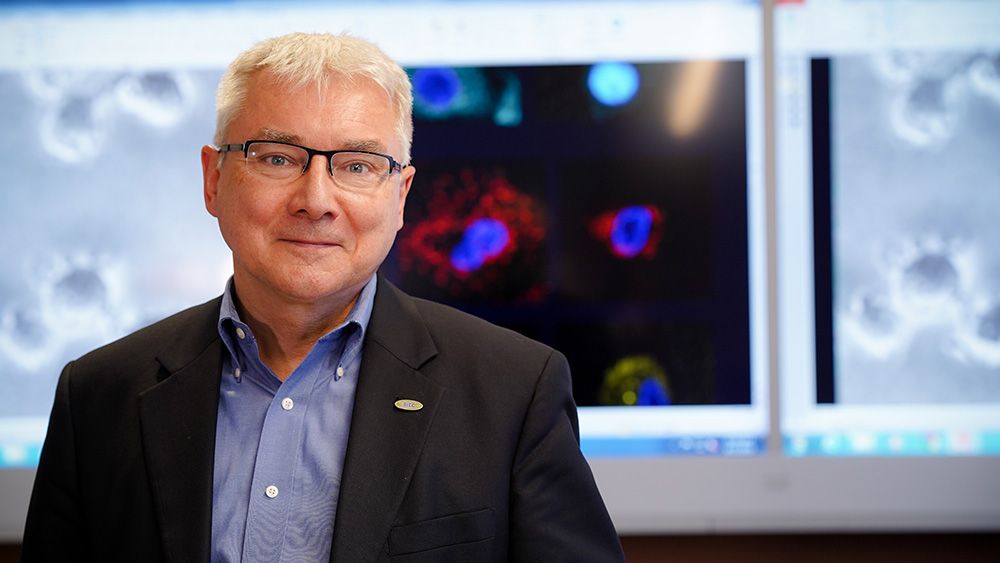Collaboration with UPMC, Mount Sinai focuses on making checkpoint-resistant cancers treatable
- Prestigious grant will fund 5 clinical trials in patients with 3 cancer types
- Focus is targeting chemokine system to make ‘cold’ tumors ‘hot’
- Strategy to be studied in patients with colorectal, ovarian or melanoma tumors
BUFFALO, N.Y. — A team led by Pawel Kalinski, MD, PhD, of Roswell Park Comprehensive Cancer Center has earned a five-year, $14.54 million award from the National Cancer Institute (NCI) to expand a promising immunotherapy platform. Funded through the NCI’s Program Project Grant program, this prestigious five-year grant will fund five clinical trials, all focused on a strategy for making some of the most common immunotherapies work for more cancer patients.
“Our goal with this project is to convert cancers that are traditionally checkpoint-resistant into treatable, ‘hot’ tumors so that more patients will be able to benefit from some of the most commonly prescribed immunotherapies,” says Dr. Kalinski, who is Vice Chair for Translational Research, the Rustum Family Professor for Molecular Therapeutics and Translational Research and Director of Cancer Vaccine and Dendritic Cell Therapies at Roswell Park.
“This five-year National Cancer Institute grant continues a long tradition of groundbreaking immunotherapy research at Roswell Park Comprehensive Cancer Center,” says Congressman Brian Higgins. “The research the clinicians at Roswell are conducting represents the next generation of transformational care for cancer patients.”
“Cancer touches every family in one way or another,” says Congressman Tom Reed. “We are pleased to see this critical grant funding delivered to right here in our backyard to promote innovative breakthroughs for cancer treatment. We will continue to be a constant advocate for Roswell Park in the halls of Congress."
Currently, depending on their cancer type and the genetic characteristics of their tumors, only about 20% of cancer patients are good candidates for a newer class of treatments called checkpoint inhibitors — drugs such as pembrolizumab (Keytruda), nivolumab (Opdivo) and ipilimumab (Yervoy). Even among those patients who are likely to respond initially to treatment with a checkpoint inhibitor, 60% to 70% are likely to have their cancers recur or progress.
“Dr. Kalinski and colleagues have built a compelling case in support of their out-of-the-box approach to cancer immunotherapy,” says Kunle Odunsi, MD, PhD, FRCOG, FACOG, Deputy Director and Executive Director of the Center for Immunotherapy at Roswell Park Comprehensive Cancer Center. “All of us in the field will be eagerly following this elegant work, which involves combinations that would uniquely harness previously untapped properties of the human immune system, and accompanied by innovative translational science that should yield greater understanding of immune responses to solid tumors.”
Dr. Kalinski has spent the last 15 years developing a unique approach to cancer immunotherapy, or cancer treatment strategies that engage the immune system — first as a faculty member at University of Pittsburgh Medical Center (UPMC), and more recently at Roswell Park.
The NCI grant, which involves partners from both UPMC and The Tisch Cancer Institute at Mount Sinai, will enable five new phase II or phase IIA clinical trials to assess the efficacy of this multipronged approach — two studies in patients with metastatic colorectal cancer, one in patients with checkpoint-resistant advanced melanoma and two in advanced ovarian cancer. Three of the five studies will be conducted at Roswell Park, with the two ovarian cancer studies to be led at UPMC’s Hillman Cancer Center, with participation from Roswell Park.
Chemokines are a type of signaling protein with the ability to control the movements and growth of many immune cells, including cancer-fighting cells called cytotoxic T lymphocytes (CTLs). Together, the trials will explore three complementary strategies for targeting chemokines to alter the tumor microenvironment, or cells surrounding cancer cells, to promote the attraction and activation of CTLs, the key antitumor immune cells.
“Based on our earlier studies both in the lab and in early-phase clinical trials, we have evidence that we can selectively promote entry of antitumor killer cells into tumor microenvironments and reduce local accumulation of suppressive cells in order to sensitize ‘cold’ tumors to immune checkpoint-inhibition therapy,” notes Dr. Kalinski.
The clinical trials will employ a chemokine-modulating regimen targeting three separate pathways of immune response — the toll-like receptor-3, type-1 interferon and prostaglandin networks — as well as specialized dendritic-cell therapeutic vaccines.
The team will also work to assess the immunologic and clinical efficacy of this new therapeutic strategy; identify the biomarkers of response; and develop optimized treatment combinations for many patients with hard-to-treat ovarian and colorectal tumors. The program will also address the pressing challenge of determining the best treatment for patients with melanoma whose tumors recur or persist despite treatment with immunotherapy.
OmniSeq Inc. will conduct advanced molecular diagnostic testing on participating patients’ tumor cells as part of the studies. AIM ImmunoTech Inc. has agreed to provide rintatolimod (brand name Ampligen), the chemokine-modulating agent to be incorporated into these studies.
The clinical trials are not yet underway. Dr. Kalinski and team expect to open all five studies by year-end 2021. When active and open to accrual, the studies will be listed on both roswellpark.org/clinicaltrials and clinicaltrials.gov.
###
Roswell Park Comprehensive Cancer Center is a community united by the drive to eliminate cancer’s grip on humanity by unlocking its secrets through personalized approaches and unleashing the healing power of hope. Founded by Dr. Roswell Park in 1898, it is the only National Cancer Institute-designated comprehensive cancer center in Upstate New York. Learn more at www.roswellpark.org, or contact us at 1-800-ROSWELL (1-800-767-9355) or ASKRoswell@RoswellPark.org.
Rebecca Vogt, Media Relations Specialist
716-845-4919; rebecca.vogt@roswellpark.org
